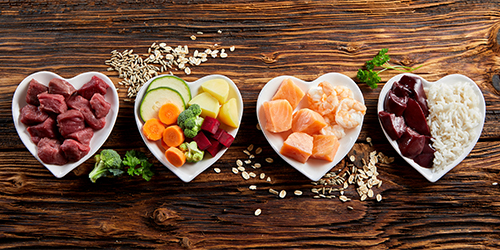You want to live as long of a life as possible. But you also want to enjoy your life as you get older. To do that, you’ll need to protect your health—mental and physical—so you can get the most out of every day.
Unfortunately, health problems can make getting older more difficult, and many of us are predisposed to specific conditions. If you know that certain diseases run in your family (like diabetes, heart disease, and osteoporosis), there’s not much you can do about your genetics.
However, you can change what you eat to reduce your risk factors and avoid suffering the same fate as your family members..
Here is a breakdown of the most common diseases, the foods you can eat to prevent them, and some foods to avoid to reduce your chances of getting the disease.

Heart Disease: Choose Your Oils Carefully
Cardiovascular diseases are the most common diseases in the United States. They’re also the most dangerous. In fact, 1 in 4 people die every year from coronary heart disease.
Don’t leave your health up to chance. Replacing saturated and trans fats with unsaturated fats, including omega-3 fatty acids, is one of the best ways to prevent heart disease.
Most people outside of the mediteranean don’t get enough omega-3 fatty acids. Our diets usually consist of soybean, corn, sunflower, and palm oils—all of which are low in heart-healthy omega-3 fatty acids.
Eating fish is a well-known and effective way to replace saturated fats with omega-3 fats, but another great way to do this is by switching out your cooking oils. Instead of using the cheaper oils, try using:
- Extra virgin olive oil—for low temperature cooking and as a salad dressing
- Virgin coconut oil—for mid-temperature cooking
- Avocado oil—for high temperature cooking
If you’re at high risk for heart disease, potassium-rich foods are another must. Potassium has many of the same cardiovascular health benefits, yet many people don’t get enough of it. Here are some foods that are high in folic acid and potassium to help you prevent some of the most debilitating diseases:
- Legumes, including beans, peas, and lentils
- Green vegetables like asparagus, spinach, Brussel sprouts, and broccoli
- Bananas
Another food to eat more of? Dark chocolate! All dark chocolate with 60 percent cacao content or higher (meaning it has lower sugar content) reduces the inflammation, one of the leading contributors of heart disease.
Diabetes: Swap Refined Sugars For Fresh Fruits
Sugar has zero nutritional value. It’s only health “benefit” is that it increases the number of calories you’re consuming, which is something most people would like to avoid. Refined sugar intake increases your risk of getting diabetes and it has been linked to weight gain.
If you’re pre-diabetic or diabetes runs in your family, aim to get less than 10 percent of your daily calories from refined sugars. The easiest way to do that is to cut sodas out of your diet. If you can’t live without your daily dose of Diet Coke, make the transition easier by replacing your sugary drinks with fruit-infused water.
The artificial sugar in most soft drinks is high fructose corn syrup. High fructose consumption, particularly from sodas, increases your risk of contracting diabetes and heart disease. Fruit, on the other hand, contain a natural sugar called fructose. Fructose is easier for your body to digest and doesn’t create the same blood sugar jump as high fructose corn syrup.
The best fruits to enjoy are:
- All berries
- Peaches
- Citrus fruits
- Honeydew melons
These fruits are all low in sugar and make delicious snacks. It’s important to note, however, you should avoid fruit juice if you are at risk for diabetes. Fruit juice is significantly higher in sugar count and can cause a large spike in blood sugar.
Replacing your saturated fats with unsaturated fats also has the added benefit of preventing diabetes. So, if you switch to the healthy oils above, you’ll help prevent cardiovascular diseases and type 2 diabetes.
Arthritis: Eat More Garlic, Eat Less Gluten
Your most important objective when preventing arthritis (or easing its symptoms) is to focus on consuming antiinflammatory foods and avoiding foods that increase inflammation. Reducing inflammation also has the added benefit of preventing many cancers.
Green tea is a delicious way to cut down inflammation. It also specifically prevents the symptoms of rheumatoid arthritis. Make sure you get it fresh, though. If you drink bottled green tea or green tea mix, it’s more likely to be processed, and you’re less likely to get the health benefits. Garlic also has antiinflammatory properties, and it’s been shown to fight cancer and heart disease, too.
Supplementing your diet with more garlic and green tea is an easy and tasty way to prevent arthritis. Now let’s look at the three most common food types to avoid and easy ways to replace them.
If you try to cut anything out for arthritis, gluten is a great place to start. With the wide availability of gluten-free alternatives, it’s easier than ever to swap out wheat for an anti-inflammatory ingredient.
2. Red meats are high in saturated fats, which can lead to inflammation and high cholesterol. It’s a good idea to cut down on beef and pork.
Similarly, frying meat (even white meat like chicken) may exacerbate the problem, leading to even higher cholesterol levels. Instead, replace red and fried meats with baked fish, which is full of antiinflammatory omega-3 fatty acids.
There are plenty of delicious dairy-free milk options, like almond milk, coconut milk, and soy milk. Vegan cheese is another option. If you can’t live without your dairy fix, opt instead for Greek yogurt, which has significant antiinflammatory properties.
Osteoporosis: Increase Your Green Veggie Intake
If you have a family history of osteoporosis, you need a diet that is high in calcium. And the best way to ensure your body takes advantage of your calcium is to increase your vitamin D intake, which triggers the production of calcium.
In addition to helping prevent diabetes and cancer, most leafy greens and fish have the added benefit of being high in calcium and vitamin D, which means they’re good for bone health. As a result, they aid in the prevention of osteoporosis.
The best leafy greens and fish to eat include:
- Sardines
- Salmon
- Kale
- Spinach
- Collard greens
Aside from leafy vegetables and fish, the best foods for calcium and vitamin D are:
- Sesame seeds
- Rhubarb
- Milk (if your diet allows It)
- Egg yolks
You may also want to supplement with garlic, which has been shown to help with hip osteoporosis, thanks to its antiinflammatory properties.
Also, take care to avoid these acids that can interfere with your calcium absorption:
- Phytic acid—Even if you eat a diet high in calcium, phytic acid is the only thing that can actually block the intake of calcium in other foods. For example, if you eat a bran cereal with milk, the phytic acid in the bran cereal would b block your intake of calcium in the milk. It’s most commonly found in grains, nuts, and legumes.
- Oxalic acid—This is the acid in raw spinach that prevents you from absorbing its calcium content. It can contribute to several nutritional deficiencies, so it’s best to cook oxalates. Other high oxalic acid foods to avoid include peanuts, pecans, rhubarb, and beets.
- Sodium—High levels of sodium also block your calcium intake. Many processed foods (especially canned soups, microwavable meals, and pre-seasoned meats) are very high in sodium. Try to limit your consumption of processed foods, chips, popcorn, pretzels, and other salty snacks.
Acid Reflux: Calm Your Stomach With Ginger
Acid reflux happens when there is an acid backflow from your stomach to the esophagus, which can also lead to heartburn.
Some foods we’ve already mentioned help prevent acid reflux, such as green leafy vegetables, seafood, and eggs.
But there are a few other options to reduce your risk of acid reflux:
In small doses, ginger has been shown to relieve gastrointestinal irritation, and can reduce the likelihood of acid flowing up into your esophagus. You can eat ginger in tea form or added to a soup or stir fry.
No matter how you consume it, try to keep it in moderation: less than an eighth of a cup per day (split up) can help with heartburn, but too much may cause gas or bloating. You should also avoid ginger ale soda, which is often packed with corn syrup.
Instead, buy ginger raw and put it in your pan when you cook your next meal. Or sprinkle some ginger into your baked goods for an extra health boost.
With its high fiber content, oatmeal makes the perfect absorbing agent to soak up the acids in your stomach that can lead to acid reflux and heartburn. It’s the perfect breakfast food for those prone to acid reflux, keeping you full without burning esophagus problems before lunch.
Citrus fruits are high in acid, which can make acid reflux worse. On the other hand, melons, bananas, apples and pears help you get your sweet fix without the high citrus content that may trigger heartburn.
Live A Longer, Healthier Life With Matrix Age Management
You can’t prevent every disease, but you can improve your odds of avoiding certain common diseases. One of the best and most accessible ways to do this is through your diet. 
As you’ve seen, certain foods have multiple disease-prevention benefits, such as fish, eggs, and bananas. But if you really want to prevent some of these common and debilitating diseases, you may have to take it a step further and cut out certain foods as well, depending on your risk factors.
At Matrix Age Management, we help you discover a new way to age disease-free. Our team of specialists can help you achieve optimum quality of life through diet, exercise, and sleep.
Everybody ages. Why not do it gracefully?
To learn the ins and outs of age management, schedule a consultation today.






